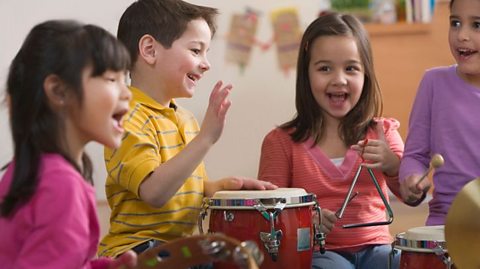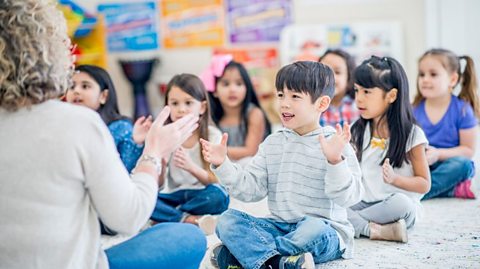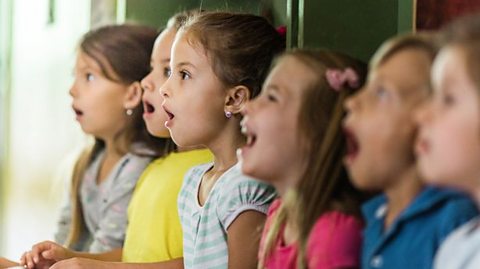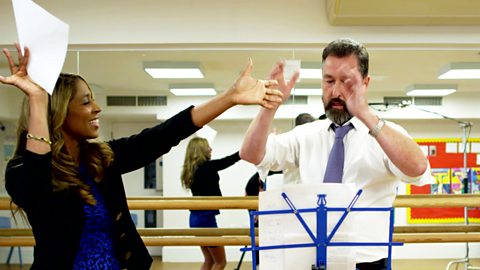
It’s Children’s Mental Health Week and more than ever it’s become important to check in with your class (as well as yourself) and encourage awareness of mental health.
We know music is used by music therapists to help with mental health issues and so through tailored musical activities, there is potential to use music as a way to help with sometimes difficult events of daily life.
Here are some easy activities to incorporate into your daily routine for four to seven-year-olds to bring the benefits of music into the classroom and beyond.
Music can help improve social skills and communication
Children in their first years at primary school can be nervous and vulnerable as they have a lot of change in their home and social life and may find it hard to gel with people, or if English is not their first language, they may struggle to communicate at all.
Here is where music can help push through that boundary as it’s universal to all, as well as a great way to bring people together.
Richard Bennett, is a music therapist at music therapy charity Nordoff Robbins
“We are musical beings.
“Every one of us has a heartbeat, and in that heartbeat we have a rhythm.
“Every one of us speaks, and in speaking we have pitch and tone.
“Pitch, tone and rhythm are the fundamental components of music.
“As such, music is part of who we are – all of us.
“It is no wonder people bond over music, as it is fundamentally entwined into what it means to be alive and interacting with the world.
“Each one of us has some relationship and connection to music, and so talking about or playing music can be a common ground on which to connect and relate to others.
“Equally, music can be an expression of one’s culture, which can be heard and understood by the other participants in the social situation.”

Music can help improve social skills and communication
Music can be extremely social, using group activities that require listening skills and teamwork. It can also improve social interaction, as Richard Bennett says:
“Music is often something that people can connect and interact with, when many other opportunities for social interaction are difficult to access.”
“Music can be something to get hold of. It can offer something familiar from someone’s past (say a familiar song), but ground it in a present and alive interaction.
“It can make being with someone possible, when that experience becomes almost impossible.”
Using these teacher technique videos, practice activities which can help improve social skills, bringing a sense of togetherness as children have to work together.
8-4-2-1 is great to energise the children
1-10 is a great group activity which help build on team work
Missing instrument encourages listening

Singing together
There have been studies and stories that prove that singing together boosts a person’s mood and even reduces pain.
Singing can also be a challenge so placing it in a supportive environment such as group singing, helps people find their voice and feel that sense of achievement.
“To sing in a supportive and nurturing environment, to show so much of yourself, and for this to be accepted, celebrated and seen as beautiful in music, can be a very enriching experience that can contribute to an individual’s sense of self-worth and self-confidence.
Watch Gareth Malone and his tips for teaching singing and then try singing together as a class with our cheerful song Hands in the Air, which is great for singing out loud and moving around.
Why not make this part of your daily routine to get children ready for a productive day?

Music taps into emotion
Music stirs emotion like nothing else and it can be a great way to help explore emotions, as Richard Bennett explains:
“Life has many distractions, particularly for children.
“Often these distractions limit children’s capacity to be present and self-aware”
Music can be a great way to express yourself even when you may not know how to.Creating music is a great way to get children to express themselves through writing lyrics or simply by making sounds.
“In the act of making music, a child is required to maintain their focus and presence in an interaction with someone else.
“This experience of being in a flow of interaction and being present, as part of a shared experience, can really help a child to gain self-awareness. Equally, music requires expressivity, coupled with control.
“This experience can encourage a child to become more sensitive and conscious of their feelings, whilst also regulating and controlling their expression.”
Check out the Thunder Jam episode with Joss Stone, which looks at writing lyrics and getting children to join in.
It’s good for children to try understand their feelings and the behaviours that come with it, music can be a way to process that.
It can also help increase motivation when a task seems daunting or difficult.
Bring the Noise Ambassador, CeCe Sammy explained how music helped her recover after a near-death experience

Use music to relax
Daily stress and anxiety is inevitable. Looking at how music is socially used, to hype you up, to create intensity in films, we can also look at it to help bring some relaxation into your day.
It’s something everyone needs and also helps with future productivity.
Problems with concentration or sensitivity to one’s environment can be tamed with music, as it can help you focus on a task and even improve listening skills.
These can be transferred to all walks of life and help you in other tasks says Richard Bennett:
“In music therapy, the people we work with often find focus much more tolerable and manageable, perhaps this is because the auditory environment is tailored to their needs.
“It must be difficult to find your surroundings provokes such anxiety and distress for you.
“In music therapy, it is possible to garner some more influence and control over your environment.
“Our experience is that through having an influence on the world around you during music therapy, that people who struggle with hyper-sensitivity often find other environments easier to manage.”
To help your class relax and wind down try using Take You Home, whilst giving the children copies of the song artwork to colour in while they listen.

Music and loneliness
Having music around you can also help you when you’re feeling lonely, you connect with the singer and with the song, and it can provide accompaniment as Richard Bennett explained:
“For many of the people we work with in music therapy, their capacity to interact with the world has been greatly limited – whether through their disability, illness, trauma or life-limiting condition.
“In music, it is possible to reach through the barriers put in place by the complexities of an individual’s life circumstance.
“Through music, you are sharing in an experience of moving through time together.
“My experience of this is that it is often a much less lonely place to be.
“Not only this, but because music is so fundamental to who we are as human beings, because it is so closely related to our social, emotional and spiritual experience of life, I often think music is the best way to offer companionship and contact in a difficult world.”
To remind yourself why music is so important and why it should be in everyone’s life, read 5 reasons why music is important.
Play It!: Explore song elements or play and sing along to music
Use the three different modes to see the elements that make up a song, play or clap along with the music or make and listen back to your own version of a song. (KS1)

CeCe Sammy: Singing tips for teachers
CeCe demonstrates some easy to apply methods for building teacher confidence delivering music lessons.
